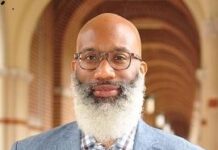 The Bentley Historical Library is in the midst of a major project to document the early history of African Americans at the University of Michigan. The task has been difficult because early records of the university did not include information on a student’s race. Researchers examined old yearbooks, class photographs, and copies of student newspapers to determine the identities of early Black students at the University of Michigan.
The Bentley Historical Library is in the midst of a major project to document the early history of African Americans at the University of Michigan. The task has been difficult because early records of the university did not include information on a student’s race. Researchers examined old yearbooks, class photographs, and copies of student newspapers to determine the identities of early Black students at the University of Michigan.
As of this month, the university has identified more than 1,700 African Americans who attended the university from 1853 to 1970. But the project goes beyond just identifying the Black students who attended the university. It also hopes to tell their stories about their life on campus and after they left the University of Michigan.
As part of the effort, researchers have visited a section of Ann Arbor where many of the Black students lived because they were not permitted to reside in university housing on campus. Many of the Black women students worked as housemaids. Some Black male students were servants for White fraternities.
Brian Williams, the lead bicentennial archivist for the Bentley Historical Library, is leading the research effort. He notes that “we’re learning who these people are, not just their names. We’re learning more what it was like to live here. They were on the edge and marginalized. And so they really aren’t integrated into the university.”
The library plans to create an online presence where visitors can provide feedback and hopefully add new names and stories to the database of early Black students at the University of Michigan.












I graduated from the UofM with a M.Mus. degree in 1961. Since I had a full-time job during the year I attended by Summer Session attendance only. It took me five sessions to complete my course of studies.
My attendance at the UofM was made possible through a grant supplied to me by the State of Alabama to keep me from attending the University of Alabama. I considered this to be a stroke of luck because there is no way I would have attended the University of Alabama even though it was in my hometown of Tuscaloosa, Alabama.
Upon arrival in Ann Arbor, Michigan I discovered Black student who had received similar grants from Fla., Ga., Virginia, Mississippi, Tenn., and many other Southern states
with the same purpose of preventing attendance at their State Universities. And people wonder why these states were so poor. These out-of-state grants were contributing factors.
That’s an absolutely fascinating bit of history! Thank you for sharing it!
Georgia A Johnson,MD “55 published a book on the Black Graduates of the University of Michigan Medical School that identifies many of the early graduates.